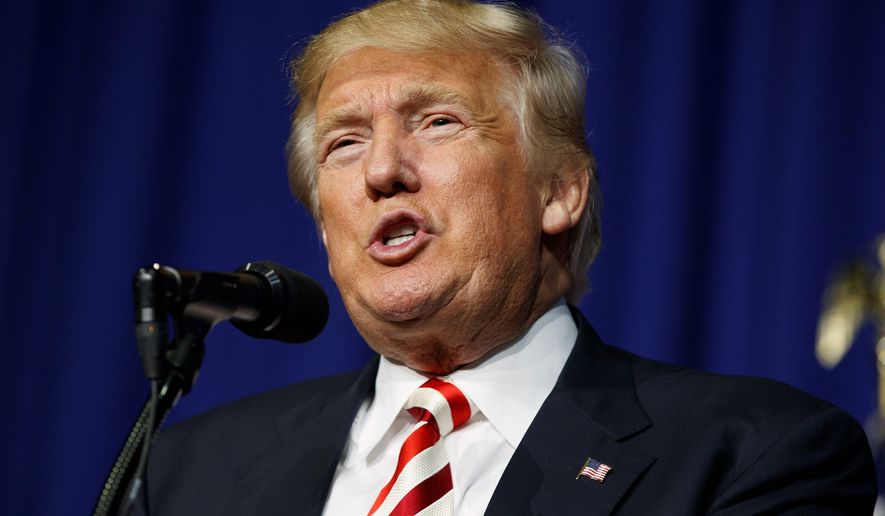Republican presidential nominee Donald Trump’s weekend foray into Detroit and strong appeal for support from black voters made waves in minority communities that have long been Democratic strongholds.
The New York billionaire’s overture to black voters, asking them to defect from Democratic nominee Hillary Clinton and her party, which he said takes them for granted, was widely met with skepticism. In some quarters of black America, however, the message rang true — or at least gave pause.
“More and more blacks are saying, ’What do we really have to lose?’” said Bishop Patrick Lane Wooden Sr., pastor at the predominantly black Upper Room Church of God in Christ in Raleigh, North Carolina.
He echoed Mr. Trump’s appeal in recent weeks, which was ridiculed for its tone, when he said to black voters: “What the hell have you got to lose?”
The pastor said that he also agreed with Mr. Trump’s assertion that Mrs. Clinton was exploiting black voters.
“She makes a visit once every four years to get the people stirred up for their vote,” he said. “When she comes to speak to the black church, all of a sudden she has a Southern dialect and carries the hot sauce in her purse, which is demeaning and patronizing.”
The black vote could be crucial in several battleground states, including Florida, Michigan, Ohio, Pennsylvania and Virginia, where blacks account for between 12 percent and 22 percent of the population.
It is particularly important in North Carolina, which flipped from red to blue for then-Sen. Barack Obama in 2008 but flipped back to red for Republican Mitt Romney in 2012. The Tar Heel State population is 22 percent black.
“If blacks would act in our own self-interest, Trump would be our choice,” said Ada M. Fisher, a GOP national committeewoman from North Carolina who long has claimed bluntly that the Democratic Party has let blacks down and it’s time a Republican presidential candidate did the same.
“Our communities, which languish in poverty, crime and economic underdevelopment, are too often Democratic-controlled,” Ms. Fisher said. “When illegal immigrants move in, too often it is at the expense of our minority communities. So, as Mr. Trump stated, ’What in the hell have we got to lose?’”
Mr. Trump faces an uphill battle in wooing black voters. Before President Obama galvanized the black vote, Republican presidential candidates typically garnered 10 percent to 12 percent support from those voters.
The real estate tycoon’s support among black voters has ticked up as the polls tightened last week, but he still garners less than 10 percent black support in most polls.
Mrs. Clinton lacks Mr. Obama’s personal appeal as the first black president, but she is still attempting to recreate the coalition that includes black and Hispanic voters to counter Mr. Trump’s advantage with white voters.
Mrs. Clinton’s reliance on support from black voters prompted her to respond forcefully to Mr. Trump’s outreach. She launched a series of attacks, including TV ads, that accused Mr. Trump of being aligned with white supremacists, the Ku Klux Klan and neo-Nazis.
At a black church in Detroit, Mr. Trump made his most impassioned appeal yet.
“We’re all brothers and sisters, and we’re all created by the same God. We must love each other and support each other, and we are in this all together. All together,” Mr. Trump said from the pulpit at Detroit’s Great Faith Ministries Church.
He called for an end to racial division in the country and a new civil rights agenda that would deliver better education, good-paying jobs and safer streets to inner-city neighborhoods.
“Our nation is too divided,” said the New York businessman. “We talk past each other, not to each other, and those who seek office do not do enough to step into the community and learn what is going on. They don’t know. They have no clue.”
“I’m here today to learn. So that we can together remedy injustice, in any form. And so that we can also remedy economics so that the African-American community can benefit economically through jobs and income and so many other different ways,” said Mr. Trump.
The address was warmly received by the congregation despite protesters outside who denounced Mr. Trump as racist.
Before the service, Mr. Trump sat for a videotaped interview with the church’s pastor, Bishop Wayne T. Jackson. The interview will by broadcast Thursday on the church’s Impact Television Network.
Mr. Jackson said that the interview and Mr. Trump’s appearance at the service were not an endorsement.
Mr. Jackson praised Mr. Trump’s address to the congregation, which included Scripture verses, and said Mr. Trump could add the title of “preacher” to his resume. The bishop also presented Mr. Trump with a prayer shawl and a Bible.
Emory University professor Andra Gillespie, a fellow specializing in race and politics at the Joint Center for Political and Economic Studies, said Mr. Trump’s previous appeals to black voters often had the wrong tone.
“The tone has just been incredibly flip and condescending,” she said. “I think it has done more to repel black voters from Trump than it has done to attract them.”
• S.A. Miller can be reached at smiller@washingtontimes.com.




Please read our comment policy before commenting.